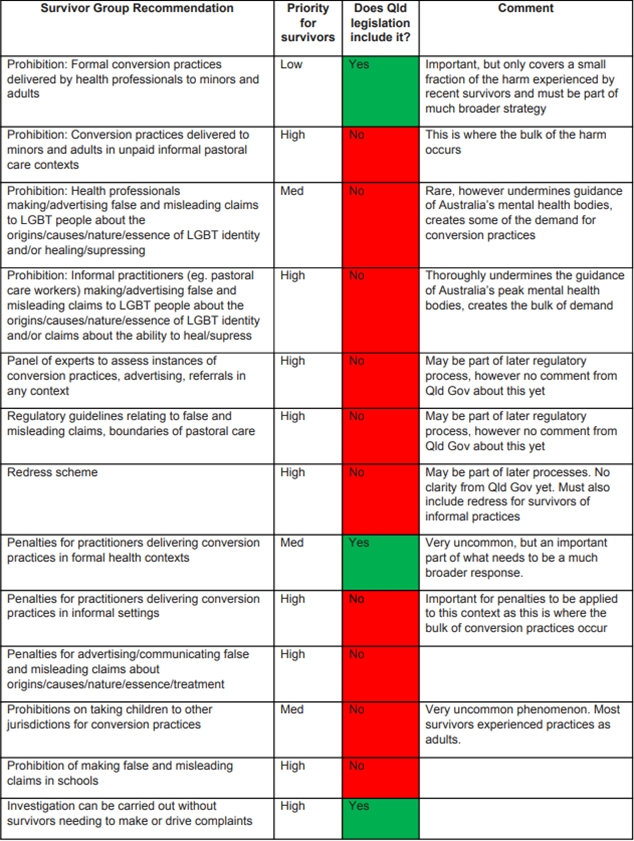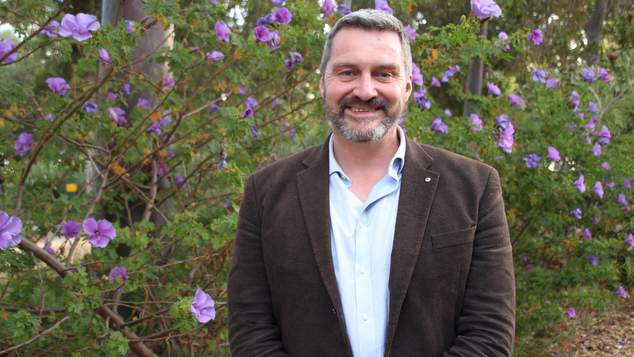OPINION: Rodney Croome is a spokesperson for just.equal and Equality Tasmania.
I know what it’s like to live in a state that is wrongly seen as backward on LGBTIQ rights and rarely has its successes celebrated.
That’s why I was reluctant to buy into criticism of Queensland’s LGBTIQ conversion practices legislation, which local advocates are proud of because it is a national first.
But the deficiencies of the legislation raise bigger issues about abandoning the vulnerable in our community and compromise in the face of resurgent anti-LGBTIQ prejudice, issues that demand to be debated.
Conversion survivors have criticised the new law for a number of reasons, chiefly that it is limited to the non-problem of formal conversion practices by health professionals and doesn’t tackle the actual problem of informal practices in religious settings.

Skeptics of banning conversion practices like Queensland law professor, Patrick Parkinson, have welcomed the legislation for the same reason, it doesn’t do anything.
As if it’s not bad enough that the legislation leaves the bulk of conversion survivors out in the cold, the wider ramifications of the new law are even worse.
It sets a terrible precedent for other states and territories that are currently considering reform.
If Queensland’s Labor Government couldn’t do better than this when it had a commanding Parliamentary majority, there is a reduced incentive for state Labor and Liberal governments with slim majorities or unpredictable upper houses to do better.
The Queensland legislation will also encourage informal and religious-based conversion practices by sending the message they’re okay.
This inadvertent legitimising of prejudice has happened before. For example, in many of those places where homosexuality was decriminalised and replaced by a higher age of consent for gay men, persecution of young gay men went up because Parliament effectively gave it the stamp of approval.
We must no longer allow the most vulnerable in our community to be punished for whatever progress we make more broadly.
Perhaps worst of all, the Queensland law is the latest example of appeasement and compromise in the face of resurgent anti-LGBTIQ prejudice.
This prejudice, coded as “religious freedom” (which means rolling back discrimination protections), “parental rights” (which means banning school inclusion programs) and “women’s safety” (which means blocking trans equality), strides across the front pages of daily newspapers straight into the policies of both major parties.
This resurgent prejudice is what lay behind the unnecessary religious caveats that made Australia’s marriage equality legislation the worst in the world.
It is what lay behind the relentless attacks on Safe Schools.
It is what lies behind a proposed, national Religious Discrimination Bill that will roll back discrimination protections for LGBTIQ people and others.
And it is what is behind the failure of the Queensland Government to do the right thing.
The only way to stop this resurgent prejudice is to stand up to it in a way that too few politicians and too few high-profile LGBTIQ advocates are currently doing.
Until we do take a stand, it will infect every law – old and new – that seeks to provide LGBTIQ people with equality and dignity.
We have been served up a plateful of bad excuses for the Queensland legislation: “it’s a step in the right direction”, “it sends a clear message against conversion practices”, “it can be fixed after the Queensland election”, “the Religious Discrimination Bill could make a better state law unconstitutional”, and “don’t let the perfect be the enemy of the good”.
I’ve already addressed the “first step” and “clear message” arguments – the Qld law sends the message that LGBTIQ young people in evangelical settings are still fair game – so let’s move on to the “we’ll get back to it” argument.
Queensland’s failure to deal with informal, religious conversion practices is effectively a religious exemption from the legislation.
LGBTIQ Australians know from decades of bitter experience campaigning against religious exemptions in anti-discrimination law, that once such exemptions are in place they are almost impossible to remove.
Even if I’m wrong and there is a possibility a re-elected Queensland Government will return to this religious exemption, that possibility is greatly diminished by campaigners refusing to highlight the problem.
Now to the possible constitutional conflict with the, as yet untabled, Religious Discrimination Bill.
This is important to address because the Religious Discrimination Bill is being used by a number of state governments as an excuse not to protect LGBTIQ people from harm.
For example, in response to calls to remove West Australia’s discrimination exemptions allowing religious schools to expel LGBTIQ kids and sack LGBTIQ staff, the WA Government is saying it has to wait to see what’s possible under the Religious Discrimination Bill.
That is errant nonsense because the Religious Discrimination Bill does not entrench any religious rights that could override a state law.
But even if it did, that would be a reason for states to stand up to any curb on their power to protect LGBTIQ citizens, rather than “waiting to see what happens”.
As for campaigning for the good rather than the perfect, I have a single word response: “Tasmania”.
Last year we enacted some of the best transgender and gender diverse legislation in the world.
We achieved this despite a fear campaign from the state government, threats of an override by the federal government and blaring headlines from the Australian newspaper.
We achieved it because we campaigned intelligently and persistently, and because we didn’t accept compromises in the face of resurgent prejudice.
Tasmania leaves the other states with no excuses.
If we can do it, you can too.
It’s time for LGBTIQ Australians to reclaim our entitlement to equality, to reinvigorate our activism and to ensure no-one is left behind.
If we don’t, we will be on the losing end of law reform for years to come.
Rodney Croome

Love OUTinPerth Campaign
Help support the publication of OUTinPerth by contributing to our
GoFundMe campaign.






